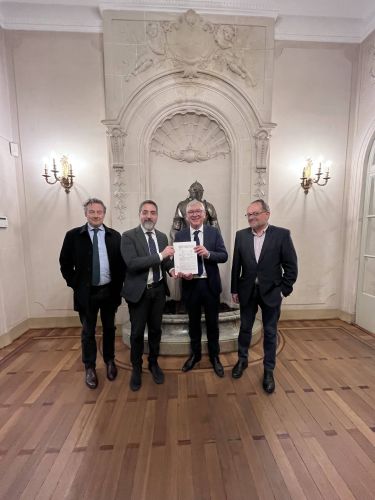A new chapter in European marine research has begun with the official creation of Eurofleets AISBL, a pan-European research infrastructure designed to revolutionize access to marine research vessels. This groundbreaking initiative was formalized in Brussels with the signing of the constitutive act by representatives from Ireland, Italy, France, and Belgium. For Belgium it was Serge Scory from the Institute of Natural Sciences who did the honours.

Eurofleets AISBL is the result of over a decade of collaboration between Europe’s leading marine research institutions. Since 2009, naval operators have worked together to establish a framework that ensures researchers across Europe, and even beyond, can access state-of-the-art research vessels. By pooling resources and expertise, this initiative will make oceanographic research more efficient, sustainable, and inclusive.
Expanding scientific access to the oceans
Marine research plays a crucial role in understanding climate change, protecting biodiversity, and managing ocean resources. However, research vessels are expensive and not all countries have the resources to operate them. Eurofleets AISBL bridges this gap, enabling scientists from different nations to collaborate and gain access to high-tech research fleets, regardless of their home country’s maritime capabilities.
This initiative will help tackle some of the most pressing scientific challenges of our time, from mapping the ocean floor to studying the effects of climate change on marine ecosystems. Through coordinated access to research vessels, scientists will be able to conduct large-scale studies that were previously out of reach for many research teams. Also the Belgian state-of-the-art research vessel RV Belgica has been part of the Eurofleets initiatives since the very beginning, and continues to be so.
A greener future for marine research
One of Eurofleets AISBL’s key goals is to drive the environmental transition of European research fleets. The initiative is committed to reducing CO2 emissions, improving energy efficiency, and promoting sustainable maritime operations. By 2030, research vessels will be expected to meet stricter environmental standards, ensuring that marine science itself does not contribute to the degradation of the ecosystems it seeks to study and protect.
Supporting the next generation of marine scientists
Beyond improving research infrastructure, Eurofleets AISBL is dedicated to training and career development. Young researchers will benefit from coordinated training programs across Europe, gaining valuable experience aboard world-class research vessels. Collaborations with universities and research organizations will further support early-career scientists, ensuring that the next generation is equipped with the skills and knowledge needed to advance marine science.
A step towards a more unified European research landscape
By streamlining access to research vessels and fostering international collaboration, Eurofleets AISBL strengthens Europe’s position as a global leader in marine science. It ensures that scientific research is not limited by national borders and that Europe can respond collectively to the challenges facing our oceans.
As this ambitious initiative sets sail, it marks a turning point for European marine science. With increased accessibility, a strong focus on sustainability, and a commitment to fostering talent, Eurofleets AISBL is poised to shape the future of oceanographic research for years to come.
